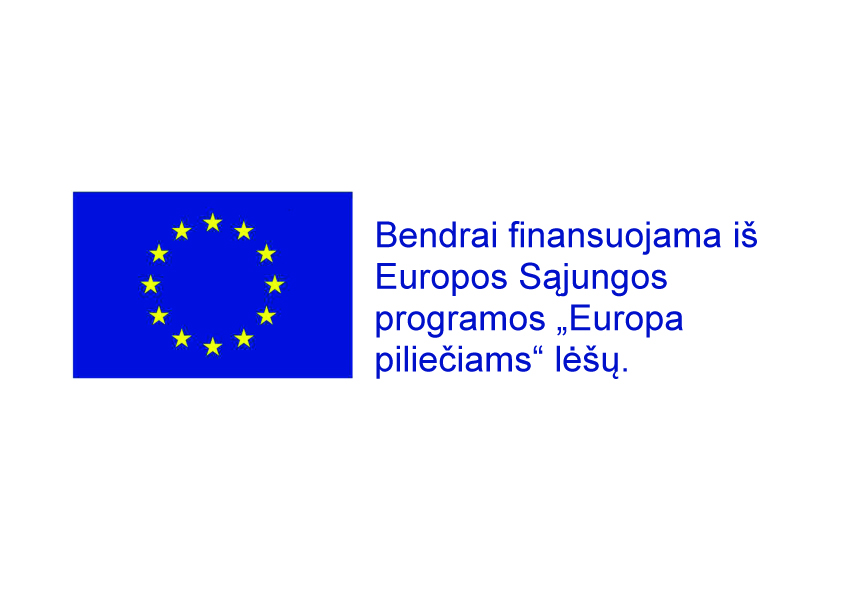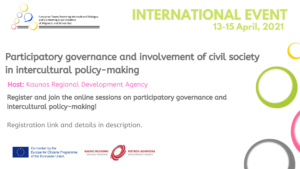
Project Europe cities


Project “European Cities for Intercultural Dialogue and Combating Discrimination against Migrants and Minorities”
The project aims to raise awareness of the richness of the EU’s cultural environment and to promote key European values such as pluralism and tolerance, facilitated by cultural exchanges, thus contributing to a respectful, dynamic and diverse European identity. The main priority of the project is to promote intercultural dialogue between the various European communities and political actors, to prevent discrimination and to combat the stigmatization of migrants and minority groups.
Projekto biudget: 148 680,00 EUR
Projekto period: 2019 m. September. 01 – 2020 m. December 31 d.
More information about the project can be found: http://www.intercultural-network.eu/?fbclid=IwAR2xYZVcEyzrFcd15VBtiPWHPn-H1t4iYTvjeZCqdZOGZ-e5f0xykk6J58s
or Facebook page: https://www.facebook.com/interculturaldialoguenetwork
This project is expected to help:
- Depending on the priority – exchange of good practice internationally – the project involves 5 past, future and current European Capitals of Culture: Rijeka (2020), Kaunas (2022), Timisoara (2021), Novi Sad (2021). and Plovdiv (2019).
Expected results of the project:
- promoting active citizenship at international level;
- support for the efforts of local and European politicians and citizens to jointly address the challenges of intercultural dialogue and the stigmatization of minorities and migrants;
- support for the activities of local authorities and civil society organizations aimed at influencing the social interaction, communication and mutual understanding of different cultural groups and promoting the inclusion of migrants and minorities in the social and cultural life of all European cities.
At least 500 EU citizens (30-40 local participants from each partner country) will be actively involved in the creation and publication of social media content and project material
The project is expected to reach around 20,000 Europeans.
5 international meetings are planned, during which the following topics will be discussed:
- Meeting in Rijeka (Croatia) – “Mentioning Cultural Diversity”, White Paper on European Initiatives on Intercultural Dialogue, Migration and the Humanitarian Crisis, and Exchange of Experiences from Different Capitals of Culture “;
- Meeting in Carnikava (Latvia) – “European cities to prevent discrimination and combat the stigmatization of migrant and minority groups in various sections of European society”;
- Meeting in Alexandrov, Łódź, Poland – “Measures to manage diversity, promote cultural dialogue and combat discrimination against migrants and minorities”;
- Meeting in Plovdiv (Bulgaria) – “The impact of the European Capitals of Culture on intercultural dialogue and the prevention of stigmatization of migrants and minorities”;
- Kaunas (Lithuania) – “Participatory governance and the involvement of civil society in the formation of intercultural policy”.
Over 3,000 participants will participate in the planning and implementation of 5 international events in Croatia, Bulgaria, Latvia, Poland and Lithuania, as well as 5 online civic discussions.
From May, each of the partners will have to start implementing local project-related activities in their region. Such one will receive up to 1000 euros per partner.
Depending on the priority – exchange of good practice internationally – the project involves 5 past, future and current European Capitals of Culture: Rijeka (2020), Kaunas (2022), Timisoara (2021), Novi Sad (2021). and Plovdiv (2019).
The project involves 15 partners from 14 countries: 11 EU members (Latvia, Poland, Croatia, Greece, Lithuania, Italy, Spain, the Netherlands, Romania, the UK and Bulgaria) and 3 neighboring countries – Serbia, Macedonia and Albania.

EVENT CONTENT:
- Discussions on participatory governance and the involvement of civil society in intercultural dialogue the policy-making process from initial idea to implementation.
- Open discussions with Lithuanian citizens, involving them in discussions and sharing experiences with network members.
EXPECTED RESULTS:
- Preconditions have been created for the development of European diversity and intercultural dialogue as tools promoting a more inclusive and just society in European cities.
- Diversity management strategies were discussed and the European Urban Network for Diversity Management was discussed and best practices for members to protect the rights of minorities and migrants.
The 2nd international event in Kaunas The European networking event “Participatory governance and the involvement of civil society in intercultural policy-making” will take place remotely, on the ZOOM platform, 2021. April 13-15 The members of the network from 14 partner European countries and at least 20 representatives from Lithuania are invited to the remote meeting by the Kaunas Regional Development Agency.
An urban networking strategy and European policy recommendations for joint urban-citizen action, intercultural dialogue, at local and pan-European level will be developed. Speakers from the Ministry of Culture of the Republic of Lithuania, Jonava District Municipality, Carnikav Municipality, Diversity Development Group, Association of Lithuanian Municipalities, Ministry of Social Security and Labor of the Republic of Lithuania, EU Investment Division National Minorities under the Government of the Republic of Lithuania, Kaunas European Capital of Culture 2022 will participate in the program, Jonava District Social Services Center and will focus on diversity development in Lithuania, migrant integration policy in Lithuania: obstacles and opportunities to discuss, diversity and cultural heritage, integration policy for foreigners in the Republic of Lithuania, national minority policy in Lithuania, challenges of local participatory governance, good integration of migrants internship in Jonava district municipality and we will also hear the presentation of “Kaunas – European Capital of Culture 2022”.
Shortened agenda below:
• 13.04, 10:00 to 14:00 CET (local time: +1: 00). Participatory governance and the involvement of civil society in the formulation of intercultural policies
• 14.04, 10: 00-13: 15, CET (local time: +1: 00) Lithuanian National Minorities Policy and Challenges for Local Application of Participatory Governance
• 15.04, 10:00 to 11:00 CET (local time: +1: 00). Integration processes and social services for migrants
The EU is not responsible for the information provided below.
Last updated: 2021-07-02